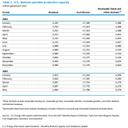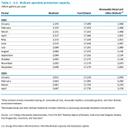Feedstocks
Todd Borgmann, CEO of Calumet Specialty Products L.P., on Aug. 4 announced that all elements of the company's Montana Renewables project met or outperformed expectations during the second quarter of 2023.
Operable biofuels production capacity in the U.S. fell slightly in May, with reductions for both ethanol and biodiesel, according to date released by the U.S. EIA on July 31. Feedstock consumption was up from both the previous month and May 2022.
Operable biofuels production capacity in the U.S. fell slightly in May, with reductions for both ethanol and biodiesel, according to date released by the U.S. EIA on July 31. Feedstock consumption was up from both the previous month and May 2022.
CVR Energy Inc. expects the feedstock PTU at its Wynnewood refinery in Oklahoma to become operational in Q4. The company is also in discussions with potential partners to develop an additional renewables project that could include SAF capacity.
Neste released second quarter financial results on July 27, reporting robust demand for renewable diesel and relatively stable feedstock pricing. SAF and renewable diesel sales were up 17 percent when compared to the second quarter of 2022.
The USDA recently released its Grain Crushings and Co-Products Production Report for July, reporting that corn use for fuel ethanol production in May was down when compared to the same month of last year.
The EPA has opened a public comment period on Class VI permits for a CCS project that would sequester CO2 produced at a fertilizer plant. Project developers say the resulting low-carbon fertilizer could help lower the CI score of corn and ethanol.
UNICA, the Brazilian sugarcane industry association, has announced sugarcane process was up during the second half of June. Ethanol production was down for the two-week period, while ethanol sales were up for the full month.
EarthDaily Agro has been selected by Global Clean Energy Holdings Inc. to support work to increase the adoption of camelina in the renewable fuels marketplace through the company's Climate-Smart Camelina Project.
The Australian Renewable Energy Agency (ARENA) on July 3 opened a $30 million sustainable aviation fuels (SAF) funding initiative that aims to reduce emissions in the aviation sector by supporting the development of a domestic SAF industry.
Casterra Ag Ltd., an integrated castor cultivation solution company and a subsidiary of Evogene Ltd., has announced additional $2.2 million of purchase orders to supply castor seeds during 2023, for new African territories.
The USDA maintained its forecast for 2023-’24 corn use in ethanol in its latest World Agricultural Supply and Demand Estimates report, released July 12. The agency, however, reduced its estimate for 2022-’23 corn use in ethanol.
The USDA will invest $300 million through President Biden’s Investing in America agenda to improve measurement, monitoring, reporting and verification of GHG emissions and carbon sequestration in climate-smart agriculture and forestry.
The USDA will invest $300 million through President Biden's Investing in America agenda to improve measurement, monitoring, reporting and verification of GHG emissions and carbon sequestration in climate-smart agriculture and forestry.
Louis Dreyfus Company and Global Clean Energy Holdings Inc. have agreed to jointly promote the sustainable cultivation of Camelina sativa (camelina) in South America, including the countries of Argentina, Paraguay, and Uruguay.
With lower production partly offset by higher beginning stocks, 2023-'24 soybean supplies are reduced 185 million bushels. Soybean crush is reduced 10 million bushels reflecting a lower soybean meal domestic disappearance forest.
North American SAF Conference & Expo announces agenda
SAF Magazine and the Commercial Aviation Alternative Fuels Initiative (CAAFI) announced the preliminary agenda for the North American SAF Conference & Expo taking place Aug. 29-30 at the Minneapolis Convention Center in Minneapolis, Minnesota.
The USDA's Risk Management Agency on June 30 announced it will expand crop insurance for camelina in direct response to the anticipated increase in demand for the crop for biofuel production. The expansion provides additional grower certainty.
UNICA, the Brazilian sugarcane industry association, has released data showing sugarcane processing was up during the first half of June. Ethanol production and sales were also up during the two-week period.
Total operable biofuels production capacity in the U.S. expanded in April, according to data released by the U.S. Energy Information Administration on June 30. Feedstock consumption was up when compared to the same month of last year.
The USDA on June 30 announced that an estimated 94.1 million acres of corn has been planted in the U.S. for 2023, up 6 percent when compared to 2022. Growers currently expect to harvest 86.3 million acres of corn for grain, up 9 percent from 2022.
Total operable biofuels production capacity in the U.S. expanded in April, according to data released by the U.S. Energy Information Administration on June 30. Feedstock consumption was up when compared to the same month of last year.
Marquis received the necessary permits for its Marquis South Dock Expansion project on the Illinois River at the Marquis Industrial Complex. The project supports a new soybean processing facility that will produce biofuel feedstock.
The USDA' on June 30 announced that an estimated 83.5 million acres of soybeans have been planted in the U.S. for 2023, down 5 percent when compared to 2022. Soybean harvested area for 2023 is estimated at 82.7 million acres, down 4 percent.
Primetals Technologies Ltd. and LanzaTech Global Inc. on June 27 announced the signing of a renewed ten-year cooperation agreement to accelerate the deployment of integrated environmental solutions for the steel industry worldwide.
Casterra Ag Ltd. has signed an agreement to sell seeds of its proprietary castor varieties to one of the world's leading oil and gas companies for cultivation in specific African territories. The seed varieties are optimized for biofuel production.
The USDA recently released its Grain Crushings and Co-Products Production report for June, reporting that corn use for fuel ethanol production in April was down when compared to both the previous month and the same month of last year.
The U.S. EPA on June 21 released its final RFS “set� rule, which includes a modest increase in biomass-based diesel RVOs for 2024 and 2025. The agency, however, elected not to finalize provisions of the proposed rule related to eRINs.
UNICA, the Brazilian sugarcane industry association, has announced sugarcane processing by mills in the south-central region of Brazil was up in late May. Ethanol production and sales were also up during the two-week period.
The ethanol industry has a role to play in the emerging SAF indsutry through both ethanol-to-jet technologies and the supply of distillers corn oil feedstock.
Advertisement
Advertisement































